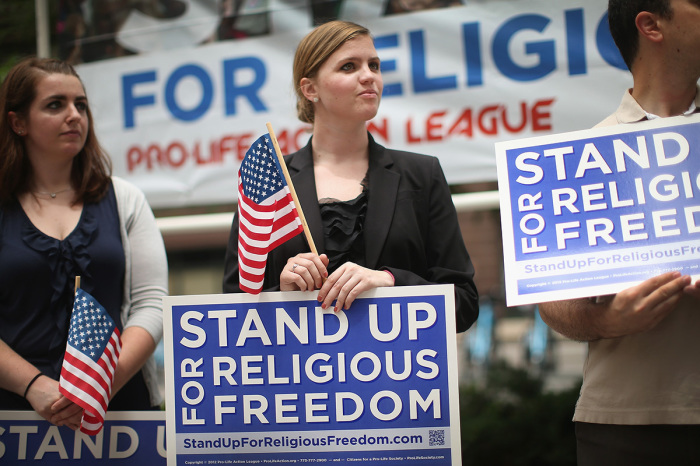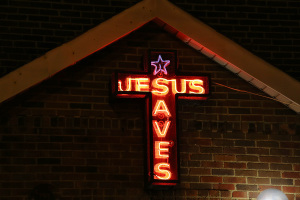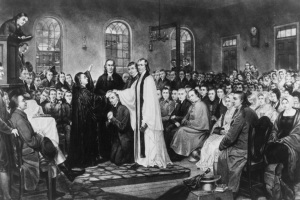Big tech, not gov't overreach, poses biggest threat to religious liberty in 2024 and beyond, legal experts warn
Despite Supreme Court victories, Evangelicals facing uncertain post-election future

“It started out as just a question. And the lawyer said, ‘Well, if you just stop praying with the team, everything should be fine.’”
Anyone who has met Coach Joe Kennedy, a Marine whose case sparked renewed debate over religious liberty in America, knows he’s a generally laid-back kind of guy — except when it comes to prayer.
Kennedy, an 18-year Marine veteran and former assistant coach for Bremerton High School’s varsity football team in Washington state, made national headlines in 2015 after being suspended and later fired for kneeling in prayer at the 50-yard line after games. His case eventually reached the U.S. Supreme Court, which ruled in 2022 that his prayers were protected under the First Amendment.
According to Kennedy, his fight for religious freedom began not with a complaint, but with praise from another school district.
“Everything just kind of went sideways in the middle of our eighth year,” he told The Christian Post for the "Politics in the Pews" podcast. “So eight years without anybody even batting an eye. And it was something cool.

“Actually, what started the whole entire controversy was we had somebody from another school district see what we were doing and called our principal and said, 'Hey, I just want to tell you, I went to my first game with you guys and I've got to tell you what your football program is doing is awesome.' So, of course, they started an investigation on what was awesome.”
When they learned about the team’s voluntary, on-field prayers, Kennedy says that's when attorneys became involved.
“Everything goes sideways and then I'm stuck where I have a decision to make of which way do I choose?” he said. “Do I choose my faith or do I choose my job?”
The Supreme Court’s 6-3 ruling in favor of Kennedy affirmed the constitutional right of public school employees to engage in brief, personal prayer, effectively overturning the “Lemon test” from the 1971 Supreme Court case Lemon v. Kurtzman. The Lemon test allowed government involvement in religion only if it served a secular purpose, did not inhibit or advance religion, and did not create excessive entanglement between church and state.
While Kennedy v. Bremerton School District will likely be viewed as a landmark case for religious liberty for years to come, it raises the question: what do Americans mean, exactly, by the phrase “religious liberty?”
When Thomas Jefferson was elected president in 1800, Baptists across America celebrated Jefferson’s victory. Despite not being an Orthodox Christian himself, Jefferson was a strong advocate for religious liberty. In celebration, the women of a Baptist church in Cheshire, Massachusetts, where Baptists had faced persecution, created a massive gift for him: a giant block of cheese.
Times have changed significantly since Jefferson's “mammoth cheese.” Today, about 63% of Americans identify as Christians, a notable drop from around 90% in the early 1990s, according to a 2022 Pew survey.
This decline in Christianity is particularly felt in states like California, where Pastor Samuel Rodriguez said the government is not just indifferent but actively anti-Christian.
“My religious liberty is constantly under assault. I live in Sacramento. The legislative body in Sacramento is cuckoo for Cocoa Puffs,” he said. “I mean, they have an anti-Christian worldview. It's very secular, totalitarian in their worldview. They can't stand the fact that we have a general Christian worldview.”
It’s not just California — a 2024 Pew survey found “governments harassed religious groups” in 183 countries, or the equivalent of 92% of the countries analyzed, up from 178 countries in 2020, the largest number that Pew has found since it began its religious freedom surveys.
In a commencement address at the Franciscan University of Steubenville in May, Supreme Court Justice Samuel Alito also sounded the alarm on religious liberty in America.
“Right now, in the world outside this beautiful campus, troubled waters are slamming against some of our most fundamental principles,” he said. “Support for freedom of speech is declining dangerously, especially where it should find the broadest and widest acceptance …
“Religious liberty is also threatened. When you venture out into the world, you may find yourself in a job, community, or social setting where you will be pressured to endorse ideas you don't believe or to abandon core beliefs. It will be up to you to stand firm.”
Likewise, in a 2022 interview with Sky News, Anglican Deacon Calvin Robinson said Christianity is the “most persecuted religion” in the world.
“Christians are being tortured, killed, executed, arrested for no crime at all, just for having the Christian faith,” Robinson told the British outlet.
Noting the historic levels of Christian persecution in Islamic countries and Afghanistan in particular, Robinson warned that anti-Christian sentiment is spreading to the West.
“We’re not just being persecuted around the world, intolerance is growing in the West, too,” he said. “It has become socially acceptable to criticize, persecute, to be hostile towards Christians in a way that people would never dream of doing to another faith.”
Ian M. Giatti is a reporter for The Christian Post and author of BACKWARDS DAD and THE ASSEMBLY ON THE ROCK. He can be reached at: ian.giatti@christianpost.com.





























